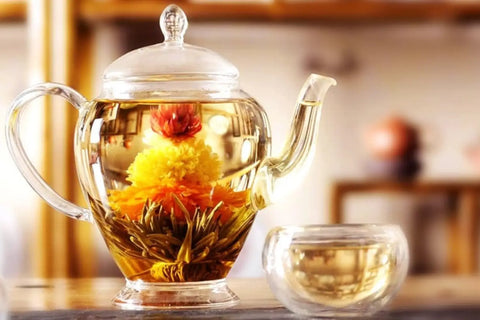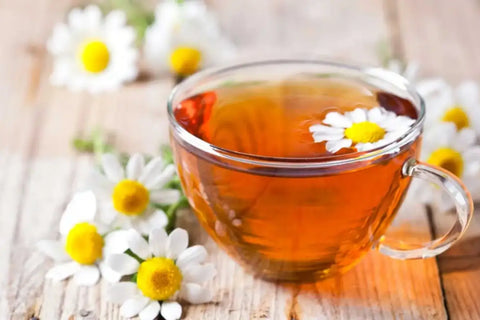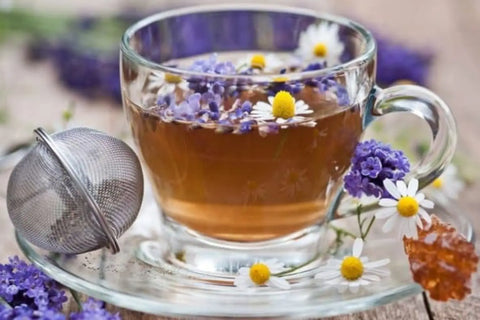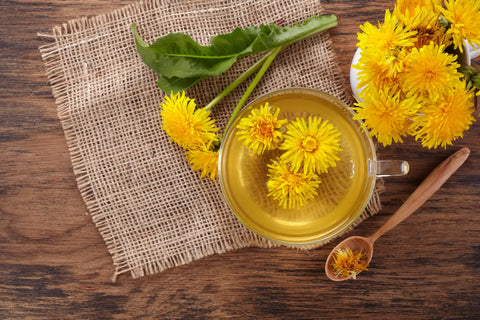Exploring the Delight of Flower Teas
Discover Popular Types of Flower Tea and Their Amazing Benefits!
Flower Tea
Tea has been a popular beverage for centuries, and its popularity has only increased over the years. While traditional teas like black tea and green tea remain popular, herbal teas, particularly flower teas, have been combined with blossoms for generations to make delectable and therapeutic brews.
A floral tea is certain to satisfy your craving, whether you're daydreaming about spring blossoms, seeking for an iced tea to sip on in the summer heat, or just curious about teas with a floral aroma. In this article, we will explore the different types of flower tea and their health benefits.

Discover Popular Types of Flower Tea and Their Amazing Benefits!
1. What is Flower Tea?
2. Different Types of Flower Tea and Their Health Benefits
2.1 Chamomile Tea: Soothing and Relaxing
2.2 Hibiscus Tea: Promotes Digestion and Lowers Blood Pressure
2.3 Rose Tea: Rich in Vitamins and Antioxidants
2.4 Lavender Tea: Calming and Reduces Anxiety
2.5 Jasmine Tea: Reduces Stress and Boosts Immune System
2.6 Chrysanthemum Tea: Enhances Immunity and Detoxifies the Body
2.7 Dandelion Tea: Rich in Nutrients and Supports Liver Function
3. Why Should You Choose Flower Tea Instead Of Coffee?
4. Conclusion
1. What is Flower Tea?
Flower tea, also known as herbal tea or tisane, is a type of tea that is made by steeping flowers in hot water. Unlike traditional tea, which is made from the leaves of the tea plant (Camellia sinensis), flower tea can be made from a variety of flowers, such as chamomile, rose, hibiscus, and lavender.
Flower teas are often prized for their unique flavors and aromas, which can vary depending on the type of flower used. Some flowers have a sweet, floral flavor, while others are more earthy or herbal. Flower tea is a great way to enjoy a natural, refreshing beverage that can help support your overall health and well-being.
2. Different Types of Flower Tea and Their Health Benefits
From improving digestion to reducing inflammation, different types of teas have unique properties that can support overall health and well-being. Here are some of the best flowers for tea:
2.1 Chamomile Tea: Soothing and Relaxing
Chamomile tea is one of the most popular flower teas, and for good reason. It has a delicate, slightly sweet taste and is known for its calming properties. Chamomile tea is caffeine-free, making it an ideal tea to drink before bedtime. Studies indicate that chamomile tea is also known to have anti-inflammatory properties, making it a great tea to drink when you're feeling under the weather.

2.2 Hibiscus Tea: Promotes Digestion and Lowers Blood Pressure
Hibiscus tea is another popular flower tea. It has a tart, cranberry-like taste and is high in vitamin C. National Institutes of Health’s research shows that hibiscus tea is also known to lower blood pressure and cholesterol levels, making it a great choice for those looking to improve their cardiovascular health.
2.3 Rose Tea: Rich in Vitamins and Antioxidants
Rose tea is made from the petals of the rose flower and has a delicate, floral taste. It is known to have anti-inflammatory properties and is also high in antioxidants. Rose tea is also known to improve digestion and boost the immune system.
2.4 Lavender Tea: Calming and Reduces Anxiety
The dried blossoms of the lavender plant are used to make lavender tea, which has a delicate, floral flavor. Because of its relaxing effects, lavender tea is frequently used to treat insomnia and anxiety. NIH researchers recommend when you're feeling under the weather, it's an excellent tea to drink because it is also believed to have antibacterial characteristics.

2.5 Jasmine Tea: Reduces Stress and Boosts Immune System
Jasmine tea is a fragrant tea made from green tea leaves and jasmine flowers. It's known for its stress-reducing properties and ability to boost the immune system. Jasmine tea can also help lower cholesterol levels and improve heart health.
2.6 Chrysanthemum Tea: Enhances Immunity and Detoxifies the Body
Chrysanthemum tea is a popular Chinese herbal tea made from dried chrysanthemum flowers. It's rich in vitamin C, which helps enhance immunity and protect against diseases. Biotechnology Research Institute says that chrysanthemum tea can also detoxify the body, improve liver function, and relieve headaches and eye strain.
2.7 Dandelion Tea: Rich in Nutrients and Supports Liver Function
Dandelion tea is made from the leaves and roots of the dandelion plant. It's a rich source of nutrients like vitamins A, C, and K, as well as calcium, iron, and potassium. Dandelion tea supports liver function and can help reduce inflammation, improve digestion, and promote healthy skin.

3. Why Should You Choose Flower Tea Instead Of Coffee?
Tea and coffee have long been popular hot beverages, enjoyed by people around the world for their flavor and caffeine boost. However, flower tea is gaining popularity and offering unique benefits:
- Unique Flavors and Aromas: Flower tea comes in a variety of flavors and aromas, making it a unique and interesting option for those looking to try something new. From sweet and floral to earthy and herbal, there is a flower tea to suit every taste preference.
- Caffeine-Free: Unlike traditional tea or coffee, flower tea is caffeine-free, making it a great option for those looking to reduce their caffeine intake or enjoy a hot beverage in the evening without disrupting their sleep.
- Cultural Significance: Many cultures around the world have a rich history of using flowers for medicinal and ceremonial purposes, and flower tea is often a part of this tradition. Drinking flower tea can be a way to connect with these cultural traditions and learn more about their significance.
- Versatility: Flower tea can be enjoyed hot or cold, and can be prepared in a variety of ways. It can be brewed on its own or combined with other ingredients to create unique flavor combinations. This versatility makes flower tea a great option for any occasion, from a cozy night to a fancy dinner party.
By choosing flower tea over traditional tea or coffee, you can enjoy a range of health benefits and a natural, refreshing taste that can help support your overall well-being.
4. Conclusion
In conclusion, the benefits of types of flower tea are vast and unique, including enhancing immunity and detoxifying the body, reducing stress, boosting the immune system, supporting liver function, and promoting overall health. If you're interested in trying out these types of flower tea for yourself, be sure to purchase high-quality tea from a reputable source like
. So why not add chrysanthemum, jasmine, and dandelion tea to your daily routine and experience their many benefits?





Leave a comment